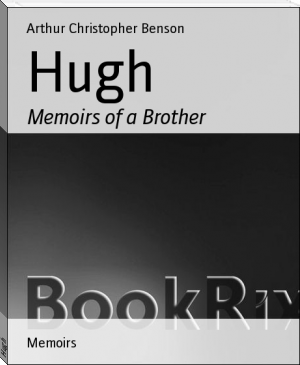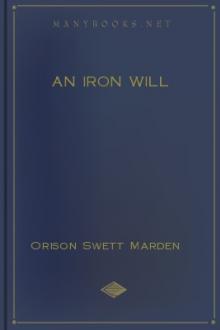Hugh by Arthur Christopher Benson (best ebook reader for ubuntu .txt) 📕

- Author: Arthur Christopher Benson
Book online «Hugh by Arthur Christopher Benson (best ebook reader for ubuntu .txt) 📕». Author Arthur Christopher Benson
He made friends, too, with the people of the village, put his chapel at their disposal for daily use, and had a Christmas festival there for them. He formed pleasant acquaintances with his country neighbours, and used to go to fish or shoot with them, or occasionally to dine out. He bought and restored a cottage which bordered on his garden, and built another house in a paddock beyond his orchard, both of which were let to friends. Thus it was not a solitary life at all.
He had in his mind for a long time a scheme which he intended to carry out as soon as he had more leisure,--for it must be remembered that much of his lecturing and occasional writing was undertaken simply to earn money to enable him to accomplish his purposes. This was to found a community of like-minded people, who desired more opportunity for quiet devotion and meditation, for solitary work and contemplation, than the life of the world could afford them. Sometimes he designed a joint establishment, sometimes small separate houses; but the essence of it all was solitude, cheered by sympathy and enough friendly companionship to avoid morbidity. At one time he planned a boys' home, in connection with the work of his friend Mr. Norman Potter, at another a home of rest for troubled and invalided people, at another a community for poor and sensitive people, who "if they could get away from squalor and conflict, would blow like flowers." With his love of precise detail, he drew up time-tables, so many hours for devotion and meditation, so many for work and exercise, so many for sociability.
But gradually his engagements increased so that he was constantly away, preaching and lecturing; and thus he was seldom at home for more than two or three days at a time. Thrice he went to Rome to preach courses of sermons, and thrice he went to America, where he made many friends. Until latterly he used to go away for holidays of various kinds, a motor tour in France, a trip to Switzerland, where he climbed mountains; and he often went to stay with Lord Kenmare at Killarney, where he stalked deer, shot and fished, and lived an out-of-door life. I remember his describing to me an incident on one of those visits, how he was returning from a deer-stalk, in the roughest clothes, when he saw a little group of people in a by-lane, and presently a message arrived to say that there was a dying woman by the roadside, and could he go to her. He went in haste, heard her confession, and gave her absolution, while the bystanders withdrew to a distance, that no word might be overheard, and stood bareheaded till the end came.
His engagement-books, of which I have several, show a dangerous activity; it is difficult to see how any man could have done so much of work involving so much strain. But he had a clear idea in his mind. He used to say that he did not expect to have a long life. "Many thanks," he wrote to a friend in 1905, in reply to a birthday letter. "I certainly want happy returns; but not very many." He also said that he was prepared for a break-down in his powers. He intended to do his work in his own way, and as much as he could while his strength lasted. At the same time he was anxious to save enough money to enable him to live quietly on at Hare Street whatever happened. The result was that even when he came back from his journeys the time at Hare Street was never a rest. He worked from morning to night at some piece of writing, and there were very few commissions for articles or books which he refused. He said latterly, in reply to an entreaty from his dear friend Canon Sharrock, who helped him to die, that he would take a holiday: "No, I never take holidays now--they make me feel so self-conscious."
He was very careful to keep up with his home and his family ties. He used to pay regular visits to Tremans, my mother's house, and was generally there at Christmas or thereabouts. Latterly he had a Christmas festival of his own at Hare Street, with special services in the chapel, with games and medals for the children, and with presents for all alike--children, tenants, servants, neighbours, and friends. My sister, who lately spent a Christmas with him, says that it was more like an ideal Christmas than anything she had ever seen, and that he himself, full of eagerness and kindness and laughter, was the centre and mainspring of it all. He used to invite himself over to Cambridge not infrequently for a night or two; and I used to run over for a day to Hare Street to see his improvements and to look round. I remember once going there for an afternoon and suggesting a stroll. We walked to a hamlet a little way off, but to my surprise he did not know the name of it, and said he had never been there. I discovered that he hardly ever left his own little domain, but took all his exercise in gardening or working with his hands. He had a regular workroom at one time in the house, where he carved, painted, or stitched tapestries--but it was all intent work. When he came to Cambridge for a day, he would collect books from all parts of the house, read them furiously, "tearing the heart out of them" like Dr. Johnson. Everything was done thus, at top speed. His correspondence was enormous; he seldom failed to acknowledge a letter, and if his advice were asked he would write at great length, quite ungrudgingly; but his constant writing told on his script. Ten years ago it was a very distinctive, artistic, finely formed hand, very much like my father's, but latterly it grew cramped and even illegible, though it always had a peculiar character, and, as is often the case with very marked hand-writings, it tended to be unconsciously imitated by his friends.
I used to wonder, in talk with him, how he found it possible to stay about so much in all sorts of houses, and see so many strange people. "Oh, one gets used to it," he said, adding: "besides, I am quite shameless now--I say that I must have a room to myself where I can work and smoke, and people are very good about that."
XIV
AUTHORSHIP
As to Hugh's books, I will here say a few words about them, because they were a marked part of himself; he put much skill and care into making them, and took fully as much rapture away. When he was writing a book, he was like a man galloping across country in a fresh sunny morning, and shouting aloud for joy. But I do not intend to make what is called an appreciation of them, and indeed am little competent to do so. I do not know the conventions of the art or the conditions of it. "Oh, I see," said a critical friend to me not long ago in much disgust, "you read a novel for the ideas and the people and the story." "What do you read it for?" I said. "Why, to see how it is done, of course," he replied. Personally I have never read a book in my life to see how it is done, and what interests me, apart from the book, is the person behind it--and that is very elementary. Moreover, I have a particular dislike of all historical novels. Fact is interesting and imagination is interesting; but I do not care for webs of imagination hung on pegs of fact. Historical novels ought to be like memoirs, and they are never in the least like memoirs; in fact they are like nothing at all, except each other.
_The Light Invisible_ always seemed to me a beautiful book. It was in 1902 that Hugh began to write it, at Mirfield. He says that a book of stories of my own, _The Hill of Trouble_, put the idea into his head--but his stories have no resemblance to mine. Mine were archaic little romances, written in a style which a not unfriendly reviewer called "painfully kind," an epigram which always gave Hugh extreme amusement. His were modern, semi-mystical tales; he says that he personally came to dislike the book intensely from the spiritual point of view, as being feverish and sentimental, and designed unconsciously to quicken his own spiritual temperature. He adds that he thought the book mischievous, as laying stress on mystical intuition rather than Divine authority, and because it substituted the imagination for the soul. That is a dogmatic objection rather than a literary objection; and I suppose he really disliked it because it reminded him later on of a time when he was moving among shadows. But it was the first book in which he spread his wings, and there is, I think, a fresh and ingenuous beauty about it, as of a delighted adventure among new faculties and powers.
I believe that the most beautiful book he ever wrote was _Richard Raynal, Solitary_; and I know he thought so himself. Of course it is an archaic book, and written, as musicians say, in a _mode_. It is easier in some ways to write a book in a style which is not authentically one's own, and literary imitation is not the highest art; but _Richard Raynal_ has the beauty of a fine tapestry designed on antique lines, yet replenished and enriched by modern emotion, like Tennyson's _Mort d'Arthur_. Yet I am sure there is a deep charm of pure beauty in the book, both of thought and handling, and I believe that he put into it the best essence of his feeling and imagination.
As to his historical books, I can feel their vigour and vitality, and their deft use of old hints and fragments. I remember once discussing one of them with him, and saying that his description of Queen Elizabeth seemed to me very vivid, but that it reminded me of a not very authentic picture of that queen, in spangled crimson and lace, which hung in the hall at Addington. Hugh laughed, and said: "Well, I must confess that very picture was in my mind!"
With regard to his more modern stories it is impossible not to be impressed by their lightness and swiftness, their flashes of beauty and emotion, their quick rippling talk; but it is hard, at times, not to feel them to be vitiated by their quite unconscious tendency to represent a point of of view. They were once called by a malign reviewer "the most detestable





Comments (0)